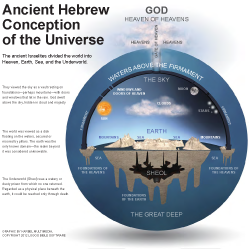3:1–12 In this section, a father encourages his son to remember his teaching, including love and faithfulness (Prov 3:1, 3). In doing so, the son will be ensured a long and successful life (vv. 2, 3:4). The father also tells his son to trust in and acknowledge Yahweh rather than his own wisdom (vv. 5–8), to honor Yahweh with his wealth (vv. 9–10), and to accept Yahweh’s discipline (vv. 11–12). |
3:1 My child See 1:8; note on 1:8–9:18.
3:2 days, years of life Proverbs ascribes blessings to those who are wise, righteous, and faithful: they can find long life and success (vv. 4; 10:2, 27; 12:28; 16:22) while the wicked will be destroyed (10:30; 11:19).
3:3 loyal love The Hebrew word used here, chesed, describes a faithful covenantal love. The characteristics in this verse are later spoken of as preserving the rule of a king (Prov 20:28).
 Chesed Word Study
Chesed Word Study
bind them around your neck A way to keep them close and ensure they will not be forgotten (Deut 6:8–9). Compare Exod 13:9 and note.
3:5 Trust Yahweh Since wisdom comes from Yahweh (Prov 2:6), He must be trusted. This often involves relying on God’s wisdom rather than human wisdom (v. 7).
3:7 Do not be wise in your own eyes Humility is a characteristic of the wise, while arrogance is an attribute of the fool (12:15; 21:24).
fear Yahweh Refers to having a correct and reverent attitude toward Yahweh. See note on 1:7.
retreat from evil Refers to both rejecting wickedness and pursuing good (Pss 34:14; 37:27).
3:9 from the firstfruits of all that will come to you The law required that the Israelites give the firstfruits of their harvest to Yahweh (see Exod 23:16–19; note on Prov 23:26; Lev 23:10–11; Deut 26:2).
3:10 your vats shall burst with new wine Wine was considered a blessing from God and a symbol of abundance. Compare Deut 7:13; Psa 104:14–15; and note on Job 24:11.
3:11 Do not despise the discipline of Yahweh Willingness to accept discipline is a characteristic of the wise. The author of Hebrews quotes these verses when encouraging readers to endure through life’s struggles (Heb 12:5–6).
3:13–20 This brief hymn extolling wisdom begins by asserting that the one who finds wisdom and understanding is “blessed” or “happy” (Prov 3:13). Wisdom is then compared to silver, gold, and precious stones (vv. 14–15). Wisdom is more valuable than any of these substances (Job 28:15–19) because of its benefits, which can include long life, riches, honor, and peace (Prov 3:15–18). Finally, the hymn describes how Yahweh used wisdom in creation (vv. 19–20). |
3:13 Happy is The Hebrew word used here, ashre, can indicate being happy or blessed (see note on Psa 1:1).
3:17 all her paths are peace Describes a path of safety and security.
3:18 a tree of life A symbol of renewal and life.
3:19 Yahweh in wisdom founded the earth God used wisdom in laying the foundation of the earth. See Job 38:4 and note; and Prov 8:22 and note.
 Personified Wisdom in the Old Testament
Personified Wisdom in the Old Testament
3:20 depths Refers to the primordial sea (see Gen 1:2 and note).
3:21–35 In this section, the father encourages his son to keep wisdom close. He describes the safety and security that comes from a life lived in wisdom (Prov 3:23–26). He then gives a series of commands pertaining to the treatment of others (vv. 27–31). Finally, he describes Yahweh’s attitude toward the wicked and the righteous (vv. 32–35). |
3:21 My child See 1:8; note on 1:8–9:18.
3:22 adornment for your neck Wisdom enhances character just as jewelry enhances physical beauty.
3:24 your sleep shall be sweet Those with wisdom sleep peacefully, confident in the protection of Yahweh (Psa 4:8; Jer 31:26).
3:27 Do not withhold good Emphasizes the moral or ethical aspect of wisdom; the wise person learns righteousness and justice. See Prov 1:3 and note.
3:29 harm The Hebrew word used here, ra'ah, can refer to harm or calamity, as well as to evil. See note on Psa 15:3.
3:31 Do not envy a man of violence Refers to the envy that comes when wicked people achieve success (Psa 73:3–14).
3:32 an abomination of Yahweh The wise should not envy people of violence because—while they may be successful—they represent an abomination to Yahweh. Under the curse of Yahweh, the wicked only achieve temporary success. Ultimately, their end is ruin (Psa 73:16–20).
3:33 The curse of Yahweh is on the house of the wicked Yahweh will ultimately send punishment on the wicked and his family (compare Prov 28:27; Deut 28:20; Mal 2:2). In the ot the family is a unit and shares the fate of the family’s head (Josh 7:24–25; Num 16:32).
3:34 those who scorn In Proverbs, the scorners or scoffers are similar to the fools. See note on Prov 1:7; and note on 1:22.

|
About Faithlife Study BibleFaithlife Study Bible (FSB) is your guide to the ancient world of the Old and New Testaments, with study notes and articles that draw from a wide range of academic research. FSB helps you learn how to think about interpretation methods and issues so that you can gain a deeper understanding of the text. |
| Copyright |
Copyright 2012 Logos Bible Software. |
| Support Info | fsb |
 Loading…
Loading…

